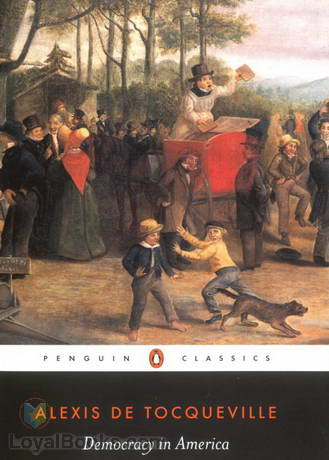
Arguably, one of the most influential and insightful pieces of work concerned with American political life, Democracy in America directs itself towards American politics and society, and is considered to be one the best books written on the subject. Published in 2 volumes, in 1835 and 1840, Tocqueville records his findings after studying the thriving nation in his nine month exploratory journey.
The young French aristocrat first came to America on an official assignment to study the American penal system, but instead used this as a pretext to study American society. Consequently, he used his time in America to analyze the improved living standards and individual social conditions which were induced by a stable democratic approach. Additionally, he set out to compare the structure of the democratic system with the aristocratic regime present in France. Tocqueville begins his expedition with a description of the shifting social circumstances, as the social and economical standing of men have become more equal unlike its aristocratic predecessor which is slowly disappearing. The first part of the book revolves around the structure of the government and analyzes American institutions which assist in upholding freedom and equality, while the second volume examines individuals and the effects of democracy in society, with economics, family life, and religion among the topics analyzed. Nevertheless, the young French aristocrat was also conscious of the dangers and threats that could appear as result of exceeding liberation and equality.
Interestingly, Tocqueville also noted some areas in society where change has been evident and made predictions about where such democratic trends could lead. Some of his judicious ideas are on the subject of slavery, status of women in society, and oligarchy. Regarded as an early work of political science and sociology, Democracy in America is an essential read to better understand the democratic system, its history, and underlying dangers. A timeless piece, highly valuable for its content on early American democracy, the observations made in the book are still relevant today, serving as a reminder of the past, and an incentive for a better future.

Other Audiobook
Audiobook: Grimms’ Fairy Tales
Talking animals, wicked stepmothers, valiant tailors, cruel witches! Sixty-two stories that feature familiar figures like
Audiobook: Moral Equivalent of War
The Moral Equivalent of War, the last public utterance of William James, is significant as
Audiobook: Mental Efficiency
In this light-hearted yet thought-provoking collection of articles, Bennett offers his thoughts on exercising the
Audiobook: Journey of Coronado
In 1540, Francisco Vásquez de Coronado led an army from Mexico is search of the
Audiobook: Thirty More Famous Stories Retold
Thirty More Famous Stories Retold, the sequel to the popular Fifty Famous Stories Retold, retells
Audiobook: Shakespeare Monologues Collection vol. 06
LibriVox readers present the sixth collection of monologues from Shakespeare’s plays. Containing 20 parts. William
Audiobook: אהבת ציון Love of Zion
Abraham Mapu was born in 1808 near Kaunas, today in Lithuania. He worked as a
Audiobook: Great Galeoto
“What touches us more closely is Echegaray’s manipulation of the modern conscience, and its illimitable
Audiobook: Condiments, Spices and Flavors
In this pamphlet no attempt has been made to give specific directions as to the
Audiobook: Mighty Animals
A book about dinosaurs written for children. In short, easy to read chapters designed to
Audiobook: Bible (DBY) AT 01-05 : Pentateuque (Genèse, Exode, Lévitique, Nombres et Deutéronome)
Ces cinq premiers livres de la Bible nous rapportent la relation de Dieu avec l’humanité
Audiobook: Coming of the Fairies
After a number of deaths in his close family, Sir Arthur Conan Doyle turned to